As a prepper, being able to grow your own crops is a vital step towards becoming totally self-sufficient.
That being said, growing your crops and taking care of a survival garden is a lot easier said than done, especially when you have no experience, and it can be very easy to make crucial mistakes along the way.
Here are the top ten mistakes that preppers who are new to gardening will often make:
Not Providing Enough Water… or Too Much of It
Plants need water! And while most novice gardeners understand this, most severely underestimate the quantity and the consistency that plants need as well.
At the same time, overwatering plants can also be a serious problem because it can cause the roots to rot early.
The trick is to water your plants consistently according to their soil type, weather conditions, and the specific water needs of each plant (be sure to research this before you begin).
Forgetting About Pest Management
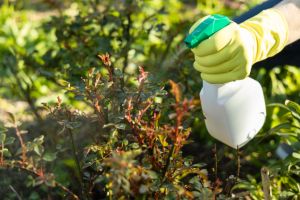 Nothing will be more disheartening when it comes to gardening than waking up one morning to find that your survival garden is faltering because of pests.
Nothing will be more disheartening when it comes to gardening than waking up one morning to find that your survival garden is faltering because of pests.
Pests, which can come as small rodents or insects or as large as deer, are are often considered the number one cause of garden failure.
That’s why you need to take proactive measures such as building a barrier around your garden to keep deer out, and investing in organic pest control methods that can keep smaller pests such as insects, slugs, or rodents at bay.
Ignoring the Health of the Soil
The health of your soil is crucial to the success of your garden, but it’s a factor that many preppers overlook. Poor soil quality can lead to nutrient deficiencies, water retention issues, and overall poor plant growth.
Before planting, take the time to test your soil’s pH and nutrient levels, and amend it as needed with organic matter, compost, and other soil amendments to create a healthy growing environment for your plants. You can learn here an easy way to test soil the way pioneers did, if you want to make sure your crops get all the necessary nutrients.
Overcrowding the Plants
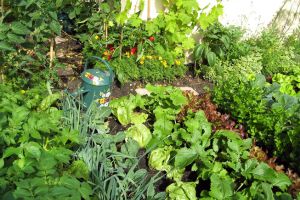 Another huge mistake that preppers can make in their gardens is overcrowding plants.
Another huge mistake that preppers can make in their gardens is overcrowding plants.
Yes, it can certainly be tempting to pack as many plants as possible into a small space to maximize yields, but overcrowding can lead to stunted growth, poor airflow, and increased susceptibility to pests.
Instead, give your plants plenty of room to grow by following spacing recommendations according to each plant.
Again, research the specific crops and plants that you plan on including in your garden before you begin the gardening process, and you’ll find out which plants do well around other plants or which ones need more space.
Overlooking Sunlight
Proper sunlight exposure is critical for plant growth and productivity, but it’s a factor that many preppers overlook when planning their survival gardens.
Planting sun-loving crops in shady areas or vice versa can result in poor yields and stunted growth.
Take the time to assess the sunlight exposure in your garden and select plant varieties that are well-suited to the available light conditions.
Over Fertilizing
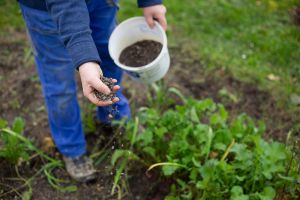 While fertilizing is essential for providing plants with the nutrients they need to thrive, over fertilizing can do more harm than good. Adding too much fertilizer to your garden will unfortunately lead to nutrient imbalances and root burn.
While fertilizing is essential for providing plants with the nutrients they need to thrive, over fertilizing can do more harm than good. Adding too much fertilizer to your garden will unfortunately lead to nutrient imbalances and root burn.
Related: How to Make Comfrey Fertilizer for an Extended Harvest
It will also be better for you to use organic fertilizers to promote healthy soil and plant growth without the risk of chemical runoff, which can be a major problem with most other fertilizers.
Skipping Mulching
Mulching is a simple yet effective technique for conserving soil moisture, suppressing weeds, and regulating soil temperature in your survival garden.
However, if you overlook this practice, it will leave your garden bed vulnerable to moisture loss and weed infestations.
Apply a layer of organic mulch, such as straw, wood chips, or compost, around your plants to retain moisture and suppress weeds in the process.
Not Pruning and Trimming
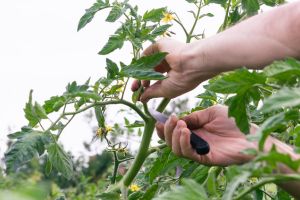 Pruning and trimming are essential gardening tasks for maintaining plant health, promoting airflow, and encouraging robust growth.
Pruning and trimming are essential gardening tasks for maintaining plant health, promoting airflow, and encouraging robust growth.
However, many preppers forget to prune and trim their plants, leading to overcrowding, disease susceptibility, and reduced yields.
Make sure you take the time to regularly prune dead or damaged branches, remove suckers, and thin out overcrowded areas to ensure healthy, productive plants in your garden.
Not Preparing Yourself for the Next Crop
Succession planting is when you plant new crops as soon as the last crop is harvested, allowing you to maximize yields and extend your growing season.
This is yet something else that many new gardens neglect as well, which leads to periods of downtime and reduced productivity.
Be sure to plan your garden layout with succession planting in mind by staggering your plantings to ensure a continuous supply of fresh produce throughout the growing season. This is key to becoming truly self-sufficient with your garden.
Having a survival garden is crucial for your preparedness strategy. Despite a well-stocked pantry, your ultimate resilience lies in getting really good at being self-sufficient, particularly in food production.
For those who are serious about surviving whatever comes their way, I strongly recommend this guide. It offers invaluable insights and practical advice for transforming your backyard into a self-sustaining homestead.
Remember, while stockpiling food serves as a temporary fix, learning how to grow your own food ensures you can keep going for the long haul.
You may also like:
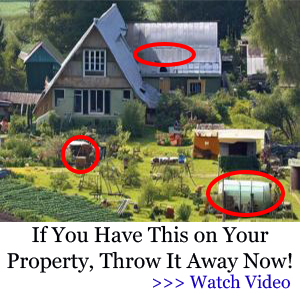 17 Items I Keep in My Fallout Shelter at All Times
17 Items I Keep in My Fallout Shelter at All Times
Whatever You Do, Don’t Chop Down This Backyard Plant (Video)
The Only Things That Preppers Should Know About Archery

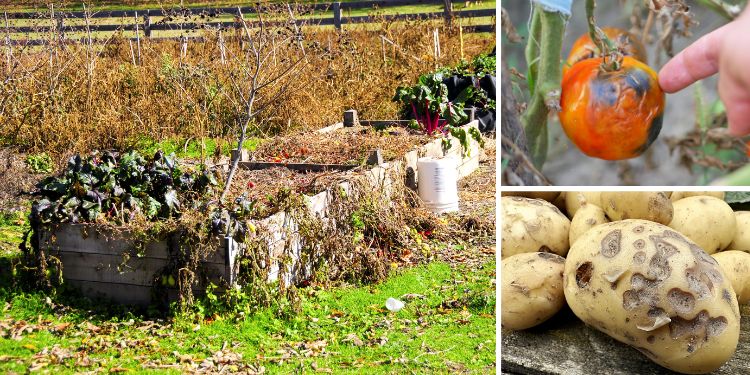






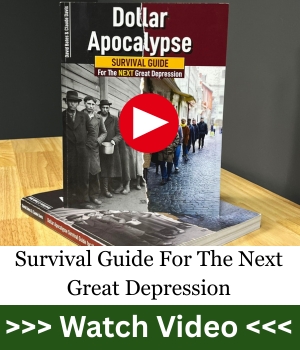



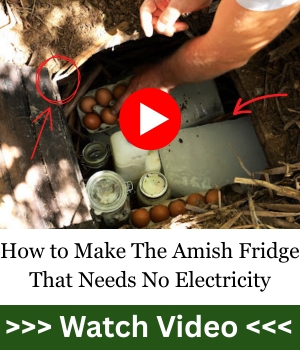

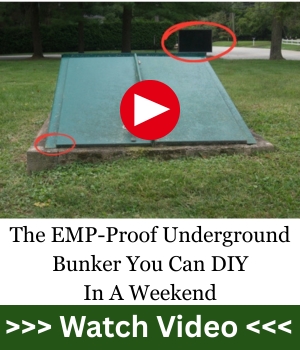






Gardening is more of an art than a science for growing plants of any kind. That is where the so called Green Thumb come to mind. People have a certain gift to grow anything plant related. While the rest of us struggle with using too much or too little water.
Then we have the food thieves two legged ones, the four legged ones, the creepy crawler and the flying ones.
Somehow we manage to get some food for our selves to eat and can food or preserve for the winter months.
I try to add new techniques to learn what works in my local area.
We have the added effects of illegals and the homeless who think they have dibs on other people’s stuff like food.
We are a country of being independent than being dependent on government welfare.
God bless MAGA.
I have a green thumb when it comes to growing WEEDS.
Brown thumb for most everything else.
About watering:
Learn how to do subirrigation.
Far less likely to over or under water plants.
Fertilizer & minerals:
Compost your fall leaves. Grass clippings if YOUR grass is ‘clean’ of chemicals.
Avoid free grass clippings as you have no way to prove if the other person poisoned them or not.
Mixing in Biochar can be quite beneficial too.
Human urine is 100% bioavailable for plants to use so long as it is ‘fresh out of the tap’ and mixed 10 parts water to 1 part urine.
If you want to boost your soil microbes, water with sulfur free molasses.
Chemical fertilizers and tap water can kill your soil.
But you CAN use limited amounts of chemical fertilizers and be OK.
American indians used to bury a fish with their seeds.
Kelp, triple washed, has LOADS of minerals in it.
We had a problem in one area of our garden last year. Turns out the local church had started spraying different chemicals on their lawn and we were collecting them for mulch. Worked ok in the past but no longer. Growing corn in that spot to cleanse the soil for now. It’s been a struggle this year as my husband is awaiting back/neck surgery and I’ve had to spend extra time helping him in the garden. We’d love to have access to our former gardening space at my parent’s farmhouse but that option is no more. I did get some great heirloom seeds planted and will be saving some good lettuce and radish seeds this year and hopefully beet and carrot seeds next year. Gardening has a huge learning curve and I’m grateful my husband has our soil built up and knows a lot. I need to stock up on better/more gardening implements so we can get more helpers/kids out helping in the garden.
This is why I take care of my neighbor’s driveway that borders my garden. I cut the weeds and grass keeping them at acceptable levels. They don’t use chemicals, but it ensures my garden is chemical free.
Back to Eden method may be helpful.
About implements – it has been said that farmers and such used to use copper implements.
They were duped into using steel implements and production slowly diminished.
Thank you for this article. I am new to gardening and just now trying to get past tomatoes, watermelon and peppers! I am old and not very self sufficient, but I want to learn and teach my granddaughter as much as I can, while I can. I have learned a lot from this site and appreciate the comments just as much and sometimes even more than the article! Thank you all for sharing your time, thought, and experience! 🥰
I’m a life long gardener and feel like every year I find a new way to screw something up, or there’s a late freeze, or (like this year) huge wind and rain storms persist all spring and just pound my poor little pepper plants into the ground. I canned gallons of produce last summer, this year gonna have to eat tasteless store vegetables.
The most important thing is the soil’s natural pH.
If you try to alter it over the long run in a field or large area don’t try, it will not work as it will be far too costly to be practical.
Do it in a small confined area like raised beds or something similar where it can be controlled easily.
Some have tried, but none have been successful over the long haul. Bugs are caused by having unhealthy soil so you have unhealthy plants, so bugs come in to clean it up.Testing the soil & plant sap will tell you what you need to know. Do a search for soil & plant sap testing.
YouTube has a vast collection of videos on the subject & farming in general.Sap testing you can do yourself One video on the subject
The Grower’s Guide to Plant Sap Analysis — Soil Doctor
Nov 16, 2023 · Plant sap analysis is for optimizing crop nutrition over time. Not one time. Plant sap analysis is NOT for identifying a one-time nutrient deficiency or those who want a yearly plant nutrient test. Tissue testing is far better for this purpose.
Author: Bryant Mason
I forgot to mention if you are trying to keep water from evaporating or containing it try using a pool liner, this is what they are made for.
Not being aware of where you are getting your hay or straw mulch and manure. Many farmers spray their crops with herbicides that persist. Even if the hay is eaten by horses or cows the pesticide will pass through into the manure.
If you end up with pesticide laded straw or hay and you apply it as mulch to your garden you are done gardening in that spot basically forever.
I would say one of the big mistakes is not starting now. Even if it’s just a few containers with some seeds. Too many people seem keen to add knowledge by reading but not willing to engage their hands and bodies in the process.
Also, many overlook the idea of a perennial, edible landscape. This will take time to develop, but having trees, bushes, and shrubs on your property that provides food will help. Learning how to make the most of these adds, too. For instance, raspberry canes provide raspberries, but the leaves can also be gathered for tea. Bee balm attracts bees to your place, and the plant has medicinal properties, too.
Learning the weeds that grow around your garden may also be useful plants; lamb’s quarter sows and grows freely and is a nutritious, edible green. Ditto pigweed.